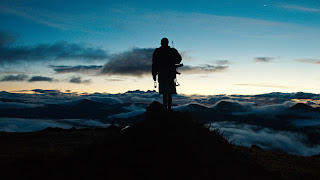Alejandro Landes' absorbing, unsettling Monos has received no end of rave reviews since it debuted at the beginning of this year. Before it made its way into cinemas, it picked up numerous festival awards, including the top prize at last month's London Film Festival. As with two other notable LFF 2019 titles - Portrait of a Lady on Fire and The Lighthouse - you just know that the Dutch-backed Monos won't quite live up to the hype that's preceded it, but it is a taut, muscular and impressive work. Landes' film appears to have been primarily designed as a sensory experience; admittedly, there's not much of a plot here, but that's not too much of a hindrance in a work which requires you to do little more than buckle up before it takes you on its nightmarish, hallucinatory journey.
The title refers to a group of child soldiers who are based at the top of a windswept, rain-lashed mountain, where they guard their American hostage Doctora (Julianne Nicholson). The members of Monos, who are only identified by code names, receive their orders from a murky organisation known as, er, The Organisation, who frequently send a messenger known as - yes - The Messenger (Wilson Salazar) to oversee some of the soldiers' training. The Monos and Doctora are joined by a dairy cow named Shakira, and the soldiers make a point of treating their bovine companion with great care - the logic being that supporters will no longer lend them things if they don't look after them. It's a hard life for all on the mountaintop - wet, cold and very muddy - yet the Monos stick to their orders in a manner which belies their age.
Just as we're getting used to this setup, the Monos' compound comes under attack, and the group are forced to flee to the jungle, where the conditions they must endure - mosquitoes, mudslides and so on - make their erstwhile home seem like a luxury resort. From this more makeshift base, Doctora realises that her odds of escaping have increased, as the Monos and their prisoner are now housed in less secure surroundings and, more crucially, the group is now characterised by in-fighting; among the many squabbles, a break from The Organisation is mooted. Gone is the previous unity, and it could be argued that the children are now merely returning to something resembling their natural state. Lord of the Flies is an obvious comparison point here - so much so that we even get to see a pig's head on a spike; refreshingly, Landes is quite transparent about his influences.
Monos is such an immersive experience that you soon forget to keep asking the many burning questions about the Monos, including: Who are they fighting? Are they involved in a much bigger conflict? Are they heroes or villains? Why are they holding Doctora? Context is lacking, which only adds to the argument that Landes wants us to respond to his film on a more primal level; a thunderous, unnerving score by British composer Mica Levi (Under the Skin) plays a huge part in conjuring an oppressive atmosphere, one in which you constantly feel as if you're on the verge of witnessing something terrible. Monos really has to be seen in a cinema, as any stepping back from its enveloping madness only leads us to deal with the film in more logical terms - and this thrill ride can't withstand such scrutiny. While Monos isn't quite as convincing a waking nightmare as those we've come to expect from Gaspar Noé (Irreversible and Climax being prime examples), Alejandro Landes' film is nonetheless a compelling, idiosyncratic and highly singular work.





